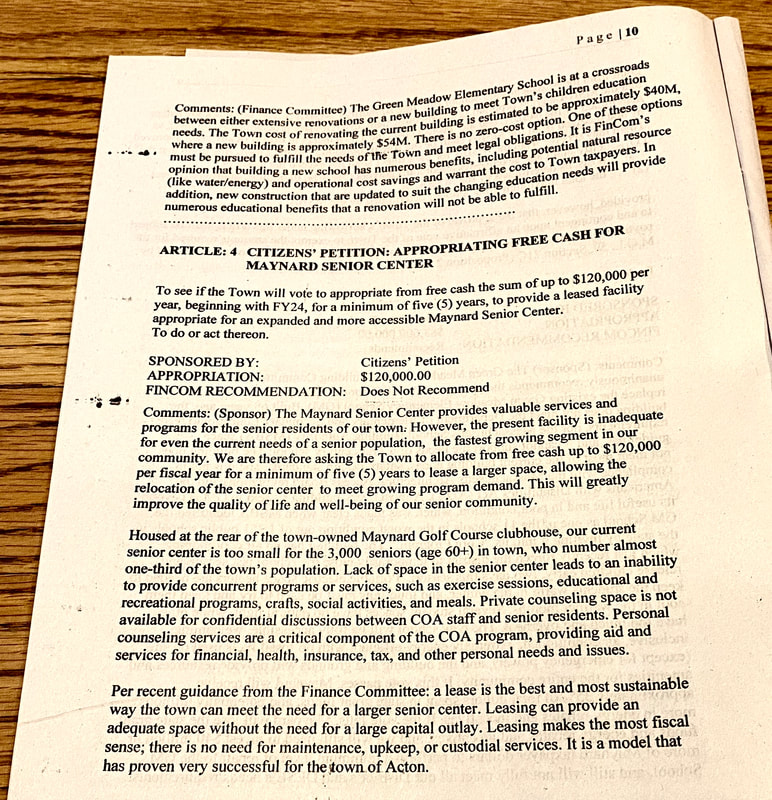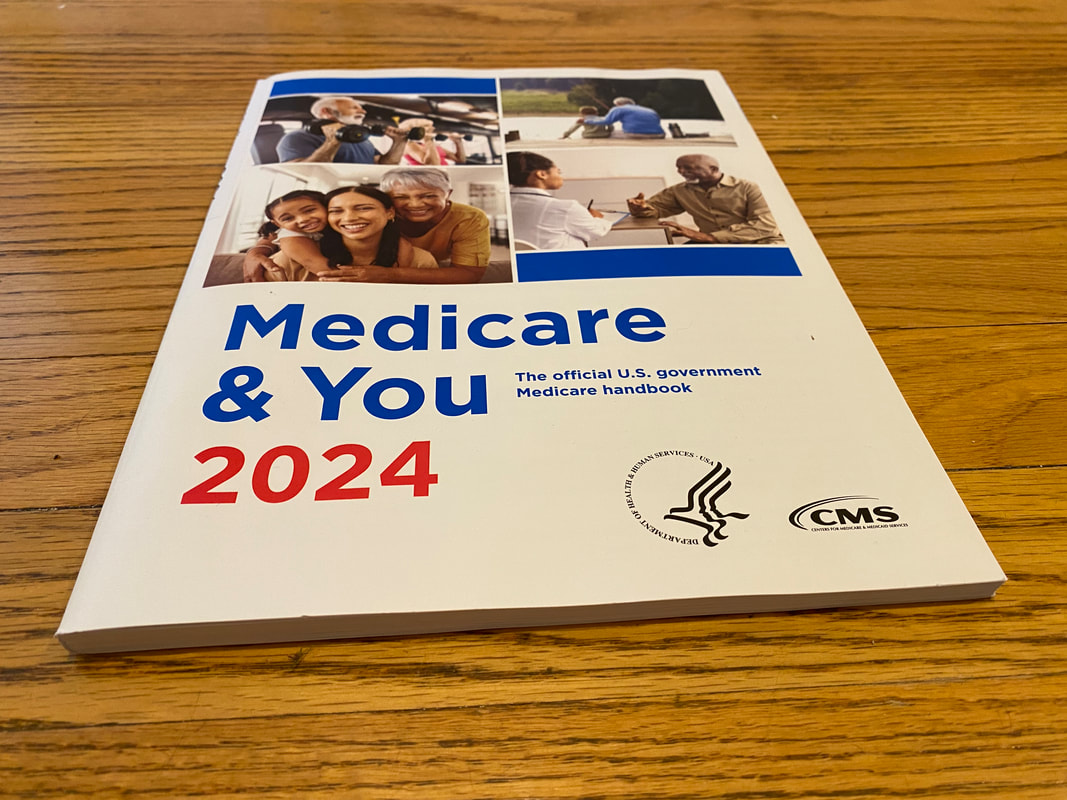|
by Vicki Brown Stevens, Special to the Town Wide Mall, with introduction and comment by Glenn C. Koenig, webmaster
Contributing reporter Vicki Brown Stevens has submitted a story, based on her interviews with a few of the Senior Center participants who joined a focus group and submitted Article 4. Vicki took photographs and created her own layout, including photo captions, so I’m including it here in PDF format, just as she submitted it. Please click the link below to read it.
The Senior Center is operated under the direction of the Council on Aging (COA), an official town government committee of five members. There is more information regarding the council on their web site, which includes a link to the Senior Center web page. https://www.townofmaynard-ma.gov/164/Council-on-Aging Their budget is included in the “General Government” budget category, shown in the Warrant under Article 5, on page 11, with their specific budget of $170,927 (budget #541), shown on page 20 in the Appendix. That amount covers two staff members in the office, a Director, and a Clerk, along with some expenses. Note: As a town government committee, The Council's members are not permitted to issue an opinion on any political matters, so they cannot recommend a vote on any Town Meeting Article, including Article 5. Update: At the Finance Committee meeting Tuesday night (Oct. 3rd), COA committee chair Mary Ann Shields stated that funding from an allocation at last May's Town Meeting, plus additional funds secured by State Representative Kate Hogan, are now finally available to start a study this coming January, 2024. She stated that the Town now has a contract with with a consulting group at UMass Boston to analyze what the senior center now does, what services are needed, and what the rest of the community desires in the way of a multi-use community center to replace the current facility. Although the group, The Center for Social and Demographic Research on Aging ( https://www.umb.edu/demographyofaging/ ) has conducted similar studies for other towns, the word is that they are dedicated to deliver a study custom designed for Maynard, rather than a mere standard one resulting from their work in other cities and towns. They will reportedly be seeking input from a wide variety of Maynard committees, groups, and residents. Comment Note: This commentary is solely the opinion of Glenn C. Koenig. I'm recommending that voters vote Yes on Article 4, even though it is only advisory, based on the Finance Committee's recommendation, as printed in the Warrant. What follows here is my impression of the current situation and the need for better support for seniors in our town.
So why has this important service been stuck here for so long? I’m sure there’s a complex story behind it, but I have only lived in Maynard since 2019, so I haven't been around to see the history unfold, first hand. Instead, I'll reflect on some general trends that may have left us in this place, and what many of Maynard's seniors face, in general. Communication, Compartmentalization, and Wisdom When I think about it, in today's world, we’ve compartmentalized ourselves. Children spend their time together in school or at summer camp. Adults now spend most of their day at work. Middle aged adults without school aged children at home often have little awareness of what the children or the seniors are doing here in town. Retirees and seniors end up living at home alone, in couples, or in senior living apartments. As we stay busy with our own lives, it's easy to lose sight of the populations we're not part of. Often, we may hold misconceptions about how others live and what needs they may have. Centuries ago, when life changed more slowly, the elderly were looked to for knowledge, experience, and wisdom. In today’s world, our culture and technology are changing so quickly that it’s sometimes difficult for anyone to keep up, regardless of their age! Knowledge, as pure information, is now available on a device we carry in our pockets. Experience, from life even a few decades ago, is often of limited use when facing today's new challenges. Wisdom can be valuable, but its value is often discounted in today's politically polarized environment. Or it may be neglected or forgotten based on the compartmentalization I just mentioned. Limited public communication in town overall (one of the reasons I started this news feed here on Town Wide Mall) just adds to the problem. Town government does have an extensive web site, but it cannot substitute for a true news source for many reasons. Senior Life Today and Life Long Learning Once someone retires, their normal income from working ends and they must depend on social security, retirement plans or annuities, if they have any, and whatever other savings they may have, to pay their expenses. People are living longer than ever, thanks to improving nutrition, medical technology, and lifestyle changes. Not too long ago, we thought that education was only for the young. You went to school, then perhaps to college, then joined the workforce. Many people worked in the same business until they retired. Now, today, that is seldom the case. More than ever, people are learning all their lives as they change jobs or even careers, in order to keep up. Even after retirement, there is still plenty of learning to do, in order to keep up with services, financial, medical, and social, that continue to change. The modern smartphone, for example, was still a prototype when Steve Jobs first introduced the iPhone, in 2007. In under 15 years it has become an essential part of our lives, supplanting almost every other communications device (the record player, the radio, the dial telephone, the TV set, the cassette player, and the VCR). This is just one example of many where experience of the past is often of little use, by now. And yet, retired folks are not that different from the rest of us, in terms of our common needs. People not only have to maintain the basic things in life, such as a place to live, food, clothing and the like, but also have as much interest in maintaining good health as anyone. Getting plenty of exercise and social time with others, along with some time outdoors, are all recognized ways to maintain good health, both mentally and physically. After all, maintaining one's health is the first priority. As the old adage goes, "An ounce of prevention is worth a pound of cure." The less we need medical care, the less time we have to spend in the doctor's office, the more we all save money (both for us and for the taxpayers), and the better quality of life we can enjoy. Senior Centers, here and in other places, are an important means of support for all these needs. As I stated above, learning how to maintain and improve a quality of life in our changing world involves a constant learning process. Some of this learning might be accomplished in a seminar or classroom environment, but much of it requires individual attention, partly because of the confidential nature of discussions regarding one's own financial and health status. Challenges Along with technology and culture, government and industry programs aimed towards the needs of seniors have continued to change rapidly as well. Here is just one example: When it comes to covering medical costs, there are many decisions to make. There are various government agencies as well as private insurance companies to deal with. Keeping track of and managing all this continues to get more and more complex over time. The requirements change from year to year, as laws and government policies change.
You don't just check a box on a form to enroll. Part D coverage is required by the government, but is only provided by a whole host of insurance companies, each of which offers a variety of options and related costs and deductibles. You have to pay for these out of your own pocket. The risk is that, if you choose poorly, you can pay more up front for coverage you don't end up using, or pay less now, but pay more later for prescriptions that you may need unexpectedly. Of course, as we all know, drug prices vary widely and sometimes change suddenly. And the plans offered by these companies can change with little notice, at the start of the following year. One plan I had doubled in price after the first two years that I was enrolled in it. I had to make more phone calls, wait on hold to talk with someone, do more research, and eventually change plans. I've had to do this twice already, since I started Medicare. Where do we go from here? I say all this to drive home the point: Help for seniors trying to navigate all this is vitally important! And what I've described in detail above is just for paying for medical insurance! I haven't covered making appointments for services, medical or otherwise, or arranging for transportation (if you can't drive or can't afford to own a car). There are various programs for helping with rent, food or meals, and perhaps just as important, connecting with others in a social atmosphere. And we would do well to strengthen our community by bringing about some better integration between our currently compartmentalized populations.
All we have is this one tiny facility with just a few small rooms, two staff members to provide services, housed in a building with treacherous sloping driveway and leaking roof. Is disgraceful a strong enough word? I think we can do way better than this! As I've tried to imply here, I don't blame anyone in particular for the current situation. But regardless of that past, I urge everyone now in Maynard to commit to learning more about what's at stake, and to pitch in to help improve this situation, as much as we can. After all, the longer we each live, the more we ourselves may end up needing exactly what the Senior Center is designed to provide!
1 Comment
10/4/2023 12:35:05 pm
Glenn Koenig, thanks for posting both the report from Vicky Brown Stevens -- which taught me, among other things, how Amy Loveless spells her name -- and your own opinion piece. I attended the FinCom's Zoom session on Monday evening, as you did. I've also been to the existing Senior Center, though not very recently. I concur completely with your summary of the situation and your proposed action concerning it at Town Meeting October 10.
Reply
Leave a Reply. |
AuthorWrite something about yourself. No need to be fancy, just an overview. Archives
June 2024
Categories |
||||||||||||||




 RSS Feed
RSS Feed